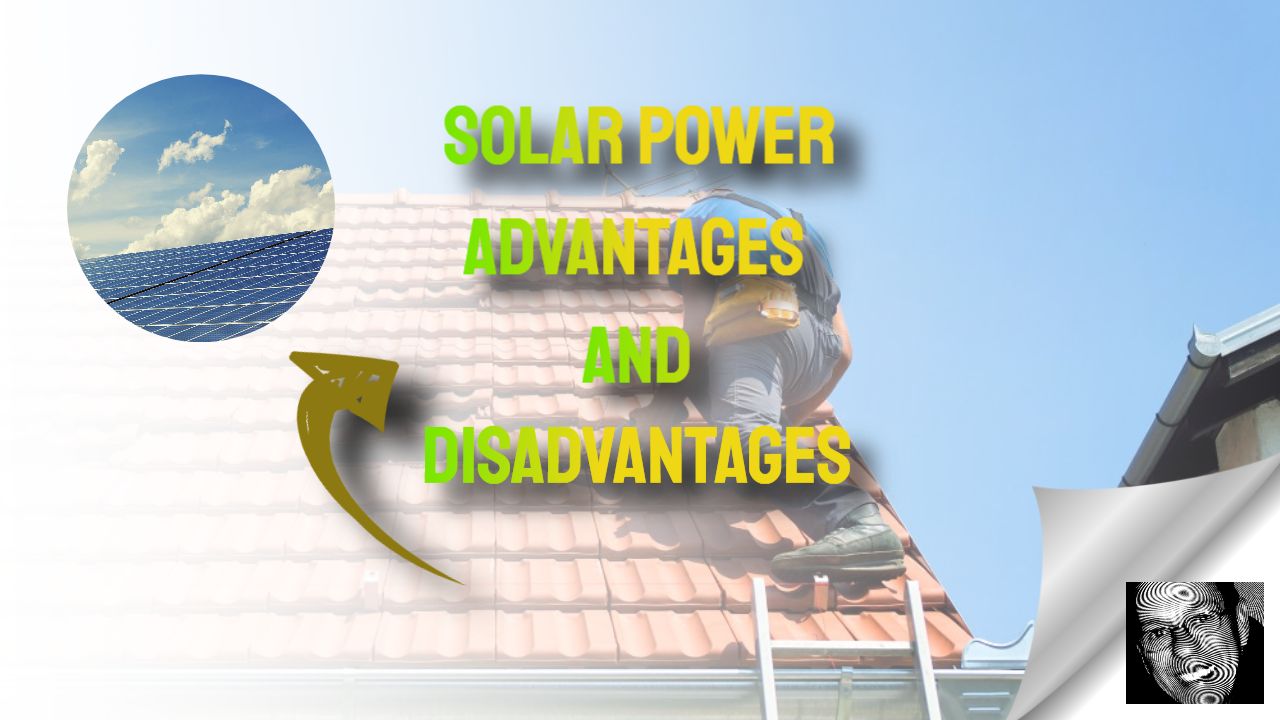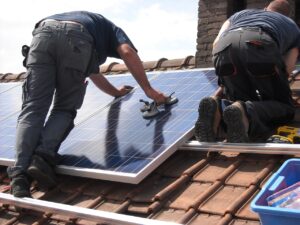Explore the Key Topics on Solar Energy
- Explore the 12 Advantages & Disadvantages of Solar Energy
- Understanding Solar Energy: A Comprehensive Overview
- Effortless Setup: Solar Lights for Your Home and Outdoors
- Discover the Key Advantages of Solar Energy
- Unlocking Solar Energy: Your Solution to Home's Green Energy Needs
- Essential Guide to Home Solar Batteries: Maximizing Energy Storage
- Effective Strategies to Store Solar Energy at Home
- Heating Your Pool with Solar Panels: A Complete Guide
- Evaluating Advantages and Disadvantages of Nuclear Energy
- Key Advantages of Nuclear Energy Explored
- Understanding the Mechanism: How Solar Panels Generate Power
- Understanding the Impact of Reduced Sunlight on Solar Power
- Weighing the Advantages and Disadvantages of Wind Energy
- Key Benefits of Wind Energy for Sustainable Power Generation
- Evaluating the Pros and Cons of Hydropower for Energy Solutions
Explore the 12 Advantages & Disadvantages of Solar Energy
When considering the implementation of solar panels in your home, understanding the advantages and disadvantages of solar energy is a crucial step in your research process as a homeowner. We will delve into some of the most significant factors influencing the decision-making process. The solar watt energy manager is a technologically advanced control unit designed for optimal energy management within your home. This unit effectively monitors both energy generation and energy consumption, providing numerous benefits for energy efficiency.
The debate surrounding nuclear energy illustrates the complexities of renewable energy sources. Advocates and critics of nuclear power passionately defend their positions, highlighting various pros and cons. Gaining insight into these advantages and disadvantages can empower you to make informed decisions regarding your energy consumption and sustainability practices.
While solar energy systems are generally user-friendly, challenges can arise due to limited installation space and the need for specific configurations to optimize efficiency. Homeowners need adequate access, such as a suitable roof or a spacious backyard, to install solar arrays effectively. For those living in apartments or condos, the feasibility of installing a personal solar array might be significantly reduced, often requiring coordination with property management to explore shared solar solutions.
The environmental benefits of solar energy are undeniable; it plays a pivotal role in the development of green buildings, relying on renewable sources like solar, wind, and geothermal energy. This shift reduces our society's reliance on fossil fuels, consequently leading to a diminished carbon footprint. However, the location of solar installations is critical; trees or nearby structures can obstruct sunlight, impacting efficiency. Homeowners must also consider their architectural designs, as some may not support solar panel installations effectively.
Recent reports indicate that Vietnam plans to reduce its feed-in tariffs for rooftop solar installations by as much as 38% next month, aimed at alleviating pressure on the nation's power grid. According to Dai Doan Ket newspaper, Hoang Tien Dung, the head of the Ministry of Industry and Trade's Electricity and Renewable Energy Bureau, noted that the tariffs will decrease to between US$0.052 and US$0.058 per kilowatt-hour, depending on system size.
If your energy bill displays a noticeable amount of room for improvement, consider solar energy as a viable solution. By harnessing the sun's abundant energy, you can power your home while potentially reducing or even disconnecting from the traditional power grid. Additionally, solar energy systems typically incur low maintenance costs throughout their lifespan, making them an attractive option for sustainability-focused homeowners.
Effortless Setup: Solar Lights for Your Home and Outdoors
Regardless of whether you're utilizing solar energy in a motorhome, campsite, or your residence, the majority of solar-powered devices are designed for portability and ease of use. You have the option to invest in individual solar products such as solar lanterns and decorative fairy lights, or you can enhance mobility with portable solar panels and batteries to create a versatile solar system tailored to your needs.
One of the top contenders in the solar generator market is the Suaoki model, known for its affordable price and straightforward setup. This generator features three different charging options, allowing you to recharge it outdoors using the Suaoki 60W solar panel, or through any compatible solar panel, AC plug, or DC input in your vehicle. With a battery capacity of 444Wh, this compact generator weighs just over 12 pounds, making it an ideal companion for camping trips, agricultural use, fishing, hunting, or construction sites.
Now that you’re familiar with the basics of solar energy, consider engaging in fun solar projects with children that are both educational and easy to set up at home. For instance, building a solar oven can transform a sunny day into an opportunity to cook delicious meals like pizza, hot dogs, or cheesy nachos. With guidance from instructional videos, you can turn a simple lesson into a fun afternoon project for the whole family.
A recent solar lighting project highlighted the versatility of portable solar lights. A client required lighting solutions for various purposes, including car parks and nearby construction sites. Instead of digging trenches for stationary lights, they opted for portable solar lights, easily movable by forklifts. This innovative solution ensured that both the parking areas and the construction site remained well-lit, showcasing the practicality of moving away from traditional lighting methods.
Discover the Key Advantages of Solar Energy
The landscape of solar energy is filled with valuable information, yet misinformation can also cloud the truth. In this segment, we will thoroughly explore the numerous advantages and disadvantages associated with installing solar panels and the solar energy industry overall. The benefits of solar energy extend across various dimensions, including financial, social, and environmental advantages. Some of these benefits are widely recognized, while others may not be as apparent; we will unpack each aspect in detail.
Ultimately, solar energy offers substantial benefits compared to its drawbacks, maintaining its status as the most accessible form of renewable energy available globally. From residential properties to commercial enterprises, the integration of solar energy systems can reduce electricity bills and diversify energy sources in preparation for potential emergencies. Furthermore, as advancements in technology continue, solar energy systems are becoming increasingly efficient and cost-effective, enabling broader adoption by homeowners and business owners alike.
Explore these insightful videos featuring experts discussing the pros and cons of hydropower; they delve into the debate surrounding renewable energy sources. Environmental activists often raise concerns about dam construction, prompting discussions about the long-term viability of hydropower. Will we prioritize renewable energy sources like solar, or will we remain reliant on fossil fuels? Is hydropower a cost-effective solution, and what disadvantages might arise from its implementation?
To summarize, the Hi-mo3 half-cut bifacial PERC module series has led the way in advancing monocrystalline PERC technology. This series is characterized by high power output, exceptional yield, and low capital expenditure (CapEx). The Hi-mo3 utilizes half-cut technology to decrease the operating current of the solar cells, effectively minimizing resistive losses and boosting power output by an average of 5-10 watts. With bifacial technology, the front panel power reaches 320W (60-cell), achieving a bifaciality ratio higher than 75%.

Unlocking Solar Energy: Your Solution to Home's Green Energy Needs
Determining which renewable energy source stands out as the best option can be a complex task. Solar energy, which generates electricity through photovoltaic cells, is increasingly being adopted in homes and businesses alike. The installation of solar panels offers numerous advantages, such as reduced energy costs and increased energy independence. As a static energy solution with no moving parts, solar panels present a reliable option for harnessing clean energy, contributing significantly to your sustainability goals.
Essential Guide to Home Solar Batteries: Maximizing Energy Storage
Every homeowner should have the opportunity to utilize solar energy on their property. In many states, this right is protected by solar access laws, which prevent local governments and homeowners' associations (HOAs) from obstructing solar energy installations. However, these laws are not universally implemented, and even in compliant states, some HOAs may still enforce outdated regulations that hinder homeowners from accessing solar technology. This comprehensive guide aims to help you navigate HOA objections regarding your solar installation, providing effective strategies to enhance the solar-friendliness of your home.
While solar energy systems present various advantages and disadvantages, if this article has sparked your interest, our 6-step guide could be advantageous in finding the best solar panels tailored to your home. This guide covers everything from roof suitability to selecting the right type of solar panels, understanding costs, saving opportunities, and maintenance tips.
For those exploring battery backup options, companies like SolarCity offer Tesla Powerwall batteries, designed to provide backup energy during outages and natural disasters. The Powerwall is compact, stackable, and features a built-in inverter, seamlessly integrating with SolarCity's solar power systems.
Historically, solar energy storage has been a challenging aspect of the solar system, as battery technology has lagged behind production technology. While we can efficiently generate substantial amounts of electricity, storing it for nighttime or cloudy day use remains problematic. Many homeowners find it challenging to manage energy storage and sell surplus energy back to utility companies.
Effective Strategies to Store Solar Energy at Home
Recognized as one of the most efficient methods to produce renewable energy for residential buildings, solar energy systems are affordable, easy to install, and require minimal maintenance. However, it's essential to acknowledge that this energy solution may not be suitable for every circumstance. As with any energy source, solar energy has its benefits and drawbacks. Before choosing to go solar for your home or business, it is wise to look beyond marketing claims and understand the core facts.
The sun generates an immense amount of energy, taking approximately 8 minutes for its rays to travel the multi-million-mile distance to reach Earth. Remarkably, each hour, enough solar energy strikes the Earth to power the entire planet for an entire year. This staggering potential raises questions about how to effectively harness it for personal use. The answer lies in solar panels.
The 2018 Solar Power Portal Awards are now accepting entries, as highlighted by Clean Energy News. This prestigious event, which has become a key highlight in the UK renewables industry calendar, marks its sixth year with a rebranding effort. The Solar Power Portal and Energy Storage News will unite to celebrate the thriving battery storage market both at home and internationally.
By employing distributed energy generation, energy efficiency improves, and waste diminishes, as the energy generators are situated closer to consumers. Utilizing renewable energy sources like solar and wind to produce electricity in homes and businesses enhances the feasibility of this model. Smaller microgrid units are less prone to simultaneous failure compared to larger systems, making distributed generation systems more reliable. Additionally, the impact of failure is less severe for a small unit than for a large one.
Heating Your Pool with Solar Panels: A Complete Guide
Solar energy applications extend beyond solar panels; solar water heaters are commonly used to heat and store water in cooler climates. These systems function by absorbing sunlight's heat through solar thermal collectors. The efficiency of solar water heaters is highly dependent on sunlight availability, allowing them to effectively meet the demand for warm water during sunny days.
Various solar panel systems can also be utilized for water heating purposes. Thermal solar solutions are environmentally friendly alternatives to gas boilers and traditional water heaters, offering a sustainable method for heating water.
In the realm of solar science kits for children, exciting developments have emerged in the solar toy market. With scalable technology, miniature solar-powered products have grown increasingly popular, providing fun and educational experiences. These solar kits can inspire curiosity and understanding of solar energy concepts among kids.
To introduce the world of ‘solar thermal energy' to children, it's important to note that the most commonly utilized solar technologies today are solar water heaters and pool heaters, which operate based on this principle. While solar panels are often the first thought when considering solar energy, thermal solar solutions provide a cost-effective entry point for those looking to adopt solar technologies.
Solar panels are primarily designed to lower energy costs and power in-home appliances and devices, but they can also be utilized for a variety of other applications. This includes controlling your pool and shower heaters, as well as charging devices like phones, radios, laptops, and more. The potential of solar energy is remarkable, offering a vast array of products that can benefit from its renewable power.
Evaluating Advantages and Disadvantages of Nuclear Energy
In today's world, there is a collective pursuit of green and renewable energy to support environmental sustainability. Solar panels are often the go-to solution for individuals seeking clean energy options. However, much like any energy solution, the installation of solar panels (or solar-integrated products) comes with its set of advantages and disadvantages. This section will explore the essential pros and cons of solar energy systems.
As with any energy source, the adoption of solar energy presents both benefits and challenges. High initial costs can be a significant drawback; while solar energy can lead to reduced electricity bills, the upfront expenses for equipment and installation can exceed $20,000. Additionally, powering devices that operate on direct current (DC) may incur higher costs.
Nuclear power generation involves a complex, multi-step process designed to contain energy and its associated negative byproducts. This methodology alone contributes to the various advantages and disadvantages associated with nuclear energy production.
While solar energy does have its drawbacks, extensive research is needed to enhance the technology before it can be fully relied upon. Nonetheless, the unsustainable nature of fossil fuel consumption underscores the importance of transitioning towards renewable energy solutions. By addressing the limitations of solar power, society can work towards a more sustainable energy future through technological advancements and strategic planning.
Key Advantages of Nuclear Energy Explored
Despite the controversies and potential disadvantages surrounding nuclear energy, there are notable advantages when compared to other energy production methods. Nuclear energy generation is typically low-cost, reliable, and does not produce greenhouse gas emissions.
Various methods are employed to ensure adequate power generation and meet load demands. This article will take a closer look at solar energy, highlighting its advantages and disadvantages compared to other energy sources such as thermal, wind, and nuclear energy.
One reason nuclear energy often faces criticism is due to its associated drawbacks, including uranium mining, water pollution, waste disposal, leaks, and safety concerns regarding reactor failures.
Given the numerous benefits and drawbacks of nuclear energy, it's understandable why it remains a contentious issue. It's essential to educate yourself on this topic to form an informed opinion regarding the use of nuclear energy moving forward.
Understanding the Mechanism: How Solar Panels Generate Power
Many electricity suppliers offer buy-back programs for surplus energy generated by solar panels and other home appliances. These programs often feature favorable buy-back rates, allowing homeowners to recoup their initial investment over time. One of the significant advantages of solar panels is their low maintenance costs.
Unlike some other expensive home projects, the costs associated with solar panel installations are primarily front-loaded. Once the installation is completed, homeowners can enjoy long-term energy savings without the burden of ongoing maintenance expenses.
Installing rooftop solar panels typically involves placing a mounting system, or “rack,” onto your roof. However, certain roofing materials found in older or historic homes, such as slate or cedar tiles, can pose challenges for solar installers, potentially complicating the installation process. Additionally, many residential and apartment buildings have skylights or other structures on their roofs, further complicating installation.
Despite these challenges, the mass adoption of solar power in the United States is unlikely to be hindered in the long run. G&H Sustainability’s innovative efforts to deliver a groundbreaking project for Asda have been shortlisted for a prestigious national award. This project, involving the installation of 984 photovoltaic panels using an innovative roof mounting system, is recognized in the Commercial Rooftop category of the 2014 Solar Power Portal Awards.
SolarCity's solar panels are designed to exceed industry standards, boasting a lifespan that outlasts many competitors by an impressive 10 years. Their solar system incorporates integrated front skirts, diverted vents, and hidden clamps and rail ends, resulting in a polished and aesthetically pleasing installation. Furthermore, all roof work and system repairs associated with SolarCity's solar panels are covered at no additional cost.
Understanding the Impact of Reduced Sunlight on Solar Power
Solar panels effectively capture sunlight and convert it into usable energy for homes, buildings, and even swimming pools. Each solar panel consists of photovoltaic cells that transform sunlight into electricity, which can power various appliances and systems within your home.
The city of Orlando, Florida, has committed to achieving a carbon-neutral government by 2030, which includes operating its vehicle fleet on 100% renewable energy and reducing overall energy consumption by 50%. The city has already implemented solar water heaters in two facilities and plans to install them in additional locations. By adding 5.7 MW of new solar energy capacity, Orlando continues to work towards its sustainability goals, including a large-scale solar farm with a capacity of 108.5 megawatts, set to be operational by the end of the year.
For an in-depth discussion, consider analyzing the advantages and disadvantages of solar water heating systems that utilize thermosiphon technology concerning energy and performance balance. How would the performance of such systems change if we were to double the size of the accumulator or the solar simulator/collector?
Weighing the Advantages and Disadvantages of Wind Energy
The advantages and disadvantages associated with solar panel installation often mirror those found in other renewable energy sources. While investing in solar technology can yield substantial benefits, it's essential to recognize that the technology is still evolving and not without its imperfections. Solar power is abundant, clean, and renewable; however, the infrastructure involved in its production and delivery can contribute to its own carbon footprint.
Hydropower, often referred to as hydroelectricity, utilizes the kinetic energy of moving water to generate electricity. While hydropower presents various advantages over other energy sources, it is important to acknowledge its drawbacks as well. The first thing to note is that hydropower is a clean, renewable energy source that does not emit harmful CO2, unlike fossil fuels. However, the environmental impact of hydropower is not entirely benign, and further exploration of its implications is warranted.
While the advantages of solar power are compelling, there are certain disadvantages to consider. In any energy solution, some drawbacks exist, and solar energy systems are no exception.
As modern citizens, we must compare the pros and cons of various renewable energy sources, including bioenergy, geothermal, hydroelectric, wind, and solar, to identify the most suitable option for our needs and particular circumstances. The rise of solar energy has transformed the energy industry, reshaping business models and the manner in which electricity is integrated into the grid. In the past, the term “municipal utility” conjured images of large, centralized power plants with towering smokestacks and nuclear reactors, but this is changing as we embrace more sustainable solutions.
Key Benefits of Wind Energy for Sustainable Power Generation
Through a deeper understanding of solar energy's advantages and disadvantages, we can effectively compare it to other renewable energy sources. Wind energy, while offering potential benefits, is not universally applicable, and commercial wind turbines can be prohibitively expensive and require significant space for installation.
As technology progresses, society is gaining access to innovative energy generation methods that do not contribute to environmental degradation. Renewable energy options, such as wind, hydro, and geothermal energy, are becoming increasingly viable alternatives to fossil fuels. Solar energy stands out as a prominent choice among these options, offering numerous benefits and drawbacks that warrant careful consideration.
The merits of renewable energy are well-established, including cleaner air, reduced carbon emissions, conservation of natural resources, and significant long-term savings. In the United States, the renewable energy sector is experiencing rapid growth, as clean energy sources now outpace coal for the first time in modern history. Wind farms, solar installations, hydroelectric facilities, and large-scale battery systems are proliferating across the nation as we work to decarbonize our electricity and transportation grids.
While solar energy generation itself is clean, the processes involved in transmission can introduce greenhouse gas emissions. Additionally, the manufacturing of solar photovoltaic systems may involve toxic materials and hazardous substances. Understanding these complexities is crucial in evaluating the overall impact of solar energy solutions.
Evaluating the Pros and Cons of Hydropower for Energy Solutions
On a positive note, solar modules continue to generate energy even on cloudy or overcast days. The efficiency of your solar system may decrease, but it will still provide savings compared to fossil fuel electricity rates, such as those charged by your current energy provider.
Hydropower has emerged as a significant energy source, but, like all energy solutions, it carries both advantages and disadvantages. Is hydropower truly a sustainable energy option? Should we actively promote its use?
Despite the significant advancements in solar power technology over the past fifty years, there remains ample room for improvement. Most solar cells achieve an efficiency rate of only around 25%, with the most advanced technology barely reaching 45%. Coupled with storage challenges, it becomes evident that solar energy stands to benefit greatly from ongoing technological enhancements in the years ahead.








Comments are closed